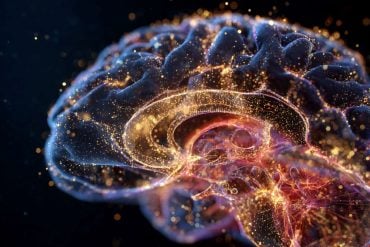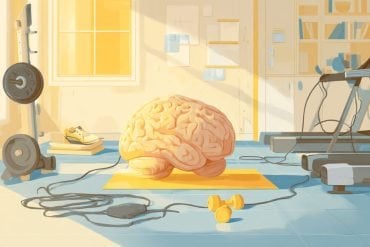Summary: A single dose of alcohol permanently alters the structure of synapses and the dynamics of mitochondria, researchers report.
Source: University of Cologne
A research team from the University of Cologne and the Universities of Mannheim and Heidelberg has found that even the single administration of alcohol permanently alters the morphology of neurons.
In particular, the structure of the synapses as well as the dynamics of mitochondria are influenced by alcohol. Using the genetic model system of the fruit fly Drosophila melanogaster, Professor Dr. Henrike Scholz and her team members Michèle Tegtmeier und Michael Berger showed that changes in the migration of mitochondria in the synapses reduce the rewarding effect of alcohol.
These results suggest that even a single consumption event can lay the foundation for alcohol addiction.
The study has appeared in PNAS .
Which changes in the brain accompany the transition from sporadic drinking to chronic alcohol abuse?
That is the question a joint research project with working groups at the University of Mannheim-Heidelberg and the University of Cologne explored. Most scientific research has examined the effects of chronic alcohol consumption on the hippocampus—the control center of our brain. Because of this, little is known about the acute neuronal interactions of critical risk factors, such as a first alcohol intoxication at an early age, explained Henrike Scholz.
“We set out to discover ethanol-dependent molecular changes. These, in turn, provide the basis for permanent cellular changes following a single acute ethanol intoxication. The effects of a single alcohol administration were examined at the molecular, cellular and behavioral levels,” said Scholz.
The working hypothesis was that, similar to the formation of memory after a single lesson, a single administration of ethanol would form a positive association with alcohol.
The team tested its hypothesis using research in fruit flies and mouse models and found ethanol-induced changes in two areas: mitochondrial dynamics and the balance between synapses in neurons. Mitochondria supply cells and especially nerve cells with energy. In order to optimally deliver the energy to the cells, the mitochondria move.
The movement of the mitochondria was disturbed in the cells treated with ethanol. The chemical balance between certain synapses was also disturbed. These changes remained permanent and were confirmed by behavioral changes in the animals: Mice and fruit flies showed increased alcohol consumption and alcohol relapse later in life.

The morphological remodeling of neurons is a well-known basis for learning and memory. These so-called cellular plasticity mechanisms, which are central to learning and memory, are also thought to be at the core of the formation of associative memories for drug-related rewards. Therefore, some of the observed morphological changes may influence ethanol-related memory formation.
Together with the migration of mitochondria in neurons, which are also important for synaptic transmission and plasticity, the researchers speculate that these ethanol-dependent cellular changes are critical for the development of addictive behaviors.
“It is remarkable that the cellular processes contributing to such complex reward behavior are conserved across species, suggesting a similar role in humans,” said Scholz. “It could be a possible general cellular process essential for learning and memory.”
Both of the observed mechanisms could explain observations made in mice that a single intoxication experience can increase alcohol consumption and alcohol relapse later in life.
“These mechanisms may even be relevant to the observation in humans that the first alcohol intoxication at an early age is a critical risk factor for later alcohol intoxication and the development of alcohol addiction,” explained Professor Scholz.
“This means that identifying lasting ethanol-dependent changes is an important first step in understanding how acute drinking can turn into chronic alcohol abuse.”
About this neuroscience research news
Author: Press Office
Source: University of Cologne
Contact: Press Office – University of Cologne
Image: The image is in the public domain
Original Research: Closed access.
“Single-dose ethanol intoxication causes acute and lasting neuronal changes in the brain” by Johannes Knabbe et al. PNAS
Abstract
Single-dose ethanol intoxication causes acute and lasting neuronal changes in the brain
Alcohol intoxication at early ages is a risk factor for the development of addictive behavior.
To uncover neuronal molecular correlates of acute ethanol intoxication, we used stable-isotope–labeled mice combined with quantitative mass spectrometry to screen more than 2,000 hippocampal proteins, of which 72 changed synaptic abundance up to twofold after ethanol exposure. Among those were mitochondrial proteins and proteins important for neuronal morphology, including MAP6 and ankyrin-G.
Based on these candidate proteins, we found acute and lasting molecular, cellular, and behavioral changes following a single intoxication in alcohol-naïve mice. Immunofluorescence analysis revealed a shortening of axon initial segments. Longitudinal two-photon in vivo imaging showed increased synaptic dynamics and mitochondrial trafficking in axons. Knockdown of mitochondrial trafficking in dopaminergic neurons abolished conditioned alcohol preference in Drosophila flies.
This study introduces mitochondrial trafficking as a process implicated in reward learning and highlights the potential of high-resolution proteomics to identify cellular mechanisms relevant for addictive behavior.







